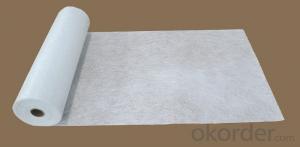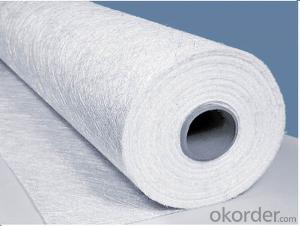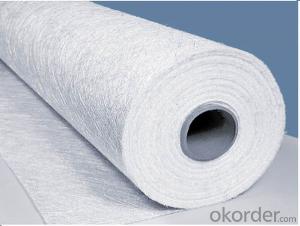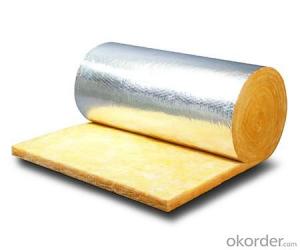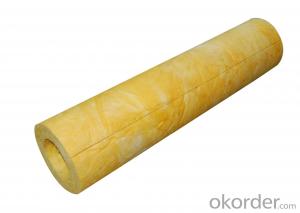E-glass Fiber Chopped Strand Mat(Powder Bonded)
- Loading Port:
- Shanghai
- Payment Terms:
- TT or LC
- Min Order Qty:
- 20000 kg
- Supply Capability:
- 200000 kg/month
OKorder Service Pledge
OKorder Financial Service
You Might Also Like
Brief Introduction
Chopped strand mat (or CSM as it is often known) is the most widely used of all composite reinforcement materials.
Short strands of glass are randomly scattered and bound to create a mat which can then be wetted out with resin and used as a general purpose reinforcement for traditional fibreglass (GRP/FRP) moulds or parts.
Product Features:
1. Fast Wet-out
2. Even thickness
3. High mechanical strength
4. Excellent wet strength retention
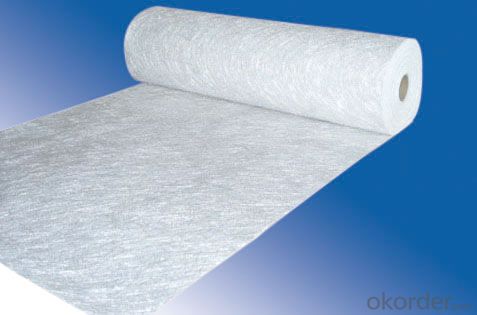
Product Specifications: Property Area Weight Moisture Content Size Content Breakage Strength Width (%) (%) (%) (N) (mm) Property IS03374 ISO3344 ISO1887 ISO3342 EMC80P ±7.5 ≤0.20 8-12 ≥40 50-3300 EMC100P ≥40 EMC120P ≥50 EMC150P 4-8 ≥50 EMC180P ≥60 EMC200P ≥60 EMC225P ≥60 EMC300P 3-4 ≥90 EMC450P ≥120 EMC600P ≥150 EMC900P ≥200
Special specification can be produce according to customer requirements.
Deliverytime
15-20days after received deposit.
Packaging
Plastic bag packing, 2 / 4 / 6 / 8 rolls in one carton box,then tray.
Other terms
We accept the CUSTOMIZATION. OEM is our strength.(spec, color, packing,etc)
- Q:Are there any environmental considerations when using fiberglass mat tissue?
- There are numerous factors to consider in terms of the environment when utilizing fiberglass mat tissue. First and foremost, the production process for fiberglass mat tissue necessitates the consumption of energy and resources. This involves extracting non-renewable raw materials like silica sand, limestone, and soda ash. Furthermore, the energy-intensive procedure of melting these materials at high temperatures contributes to greenhouse gas emissions. In addition, the manufacturing of fiberglass entails the utilization of chemicals such as resins and binders, which can be environmentally harmful if not properly managed. If these chemicals are not handled and disposed of correctly, there is a potential risk of them seeping into water bodies or soil. Moreover, fiberglass mat tissue is not capable of biodegradation. It can take hundreds of years for it to decompose in a landfill. Inadequate disposal of fiberglass mat tissue can lead to environmental pollution and contribute to the ongoing waste management issue. Lastly, the use of fiberglass mat tissue in certain applications, such as insulation or construction, can have implications on energy efficiency. While fiberglass is an effective insulator, its production and installation may require additional energy inputs, such as the use of fossil fuels for transportation or heating during installation. To address these environmental considerations, it is crucial to promote sustainable practices in the production and use of fiberglass mat tissue. This can involve implementing energy-efficient manufacturing processes, reducing the utilization of harmful chemicals, encouraging the recycling or reuse of fiberglass materials, and exploring alternative materials with lower environmental impacts.
- Q:Is fiberglass mat tissue resistant to chemicals?
- Yes, fiberglass mat tissue is generally resistant to chemicals. The composition of fiberglass mat tissue, which consists of fine glass fibers bonded together with a resin, provides it with excellent chemical resistance properties. This resistance allows the fiberglass mat tissue to withstand exposure to a wide range of chemicals without deteriorating or losing its structural integrity. However, it is important to note that the specific chemical resistance of fiberglass mat tissue may vary depending on the type and concentration of the chemical it comes into contact with. Therefore, it is always advisable to consult the manufacturer's guidelines or conduct appropriate testing to ensure compatibility with specific chemicals.
- Q:What are the different types of fiberglass mat tissue available in the market?
- In the market, you can find various types of fiberglass mat tissue, each with its own distinct characteristics and applications. 1. Chopped Strand Mat (CSM): This is a commonly used fiberglass mat tissue. It consists of randomly oriented chopped strands of glass fibers held together by a binder. CSM is widely utilized in industries like construction, automotive, and marine due to its excellent strength and cost-effectiveness. 2. Continuous Filament Mat (CFM): Unlike CSM, CFM is made up of continuous strands of glass fibers. This type of fiberglass mat tissue offers enhanced strength and stiffness, making it suitable for applications that require higher performance and durability. 3. Woven Roving: Woven roving is created by weaving parallel rovings together. It provides a higher strength-to-weight ratio compared to CSM and CFM, making it ideal for applications that require additional reinforcement. 4. Surface Veil: Surface veils are lightweight fiberglass mat tissues primarily used for surface protection and cosmetic purposes. They are typically applied as a thin layer on the surface of other fiberglass materials to improve smoothness, appearance, and resistance to cracking or chipping. 5. Stitched Mat: Stitched mat is a type of fiberglass mat tissue where the fibers are stitched together using thread or yarn. This stitching enhances the mat's stability and structural integrity, making it suitable for applications that require enhanced dimensional stability and strength. 6. Composite Mat: Composite mat is a combination of different materials, including fiberglass, polyester, and other synthetic fibers. It offers a unique combination of properties such as strength, flexibility, and resistance to chemicals, making it suitable for a wide range of applications. In conclusion, the market provides a diverse range of fiberglass mat tissues to cater to specific needs and requirements in various industries.
- Q:Is fiberglass mat tissue resistant to oil and grease?
- Indeed, oil and grease do not affect fiberglass mat tissue due to its resistance. The structure of this tissue encompasses delicate glass fibers, tightly bound by a resin. This resin serves as a protective shield, prohibiting the penetration of oil and grease into the mat tissue, thus granting it resistance against these substances. Moreover, fiberglass possesses inherent non-reactive characteristics, amplifying its ability to withstand oil and grease. Consequently, fiberglass mat tissue proves to be an exemplary material for circumstances involving anticipated contact with oil and grease, such as industrial environments or automotive components.
- Q:Can fiberglass mat tissue be used for making insulation blankets?
- Yes, fiberglass mat tissue can be used for making insulation blankets. Fiberglass mat tissue is a lightweight and flexible material that is commonly used in insulation applications. It offers excellent thermal insulation properties, as well as resistance to fire, moisture, and chemicals. Additionally, fiberglass mat tissue is easy to handle and install, making it an ideal choice for creating insulation blankets that can be used in various industries, such as construction, automotive, and aerospace.
- Q:How does fiberglass mat tissue compare to cellulose insulation?
- Fiberglass mat tissue and cellulose insulation differ in terms of material composition and insulation properties. Fiberglass mat tissue is made from fine glass fibers, while cellulose insulation is composed of recycled paper fibers treated with fire-retardant chemicals. Fiberglass mat tissue offers higher R-value, meaning it provides better thermal insulation and energy efficiency. Additionally, it is resistant to moisture and does not promote mold growth. On the other hand, cellulose insulation is more affordable, environmentally friendly, and provides better sound insulation. Ultimately, the choice between the two depends on specific insulation needs, budget, and environmental considerations.
- Q:Can fiberglass mat tissue be recycled?
- Yes, fiberglass mat tissue can be recycled. It is a common practice to recycle fiberglass waste, including fiberglass mat tissue, by breaking it down into smaller fibers and using it as a raw material in various industries such as insulation, construction, and automotive. Recycling fiberglass helps to reduce waste and conserves resources.
- Q:Is fiberglass mat tissue suitable for insulation in sports facilities?
- Yes, fiberglass mat tissue is suitable for insulation in sports facilities. It is a commonly used material for insulation due to its excellent thermal insulation properties, durability, and resistance to moisture. Additionally, fiberglass mat tissue is lightweight and easy to install, making it a practical choice for sports facilities where energy efficiency and temperature control are important factors.
- Q:Can fiberglass mat tissue be used for making insulation panels?
- Yes, fiberglass mat tissue can be used for making insulation panels. It is a commonly used material due to its excellent thermal insulation properties and its ability to resist heat and cold. Additionally, fiberglass mat tissue is lightweight, durable, and can be easily molded into various shapes and sizes, making it suitable for insulation panel production.
- Q:Is fiberglass mat tissue resistant to mildew and rot?
- Yes, fiberglass mat tissue is resistant to mildew and rot.
1. Manufacturer Overview |
|
|---|---|
| Location | |
| Year Established | |
| Annual Output Value | |
| Main Markets | |
| Company Certifications | |
2. Manufacturer Certificates |
|
|---|---|
| a) Certification Name | |
| Range | |
| Reference | |
| Validity Period | |
3. Manufacturer Capability |
|
|---|---|
| a)Trade Capacity | |
| Nearest Port | |
| Export Percentage | |
| No.of Employees in Trade Department | |
| Language Spoken: | |
| b)Factory Information | |
| Factory Size: | |
| No. of Production Lines | |
| Contract Manufacturing | |
| Product Price Range | |
Send your message to us
E-glass Fiber Chopped Strand Mat(Powder Bonded)
- Loading Port:
- Shanghai
- Payment Terms:
- TT or LC
- Min Order Qty:
- 20000 kg
- Supply Capability:
- 200000 kg/month
OKorder Service Pledge
OKorder Financial Service
Similar products
New products
Hot products
Hot Searches
Related keywords
